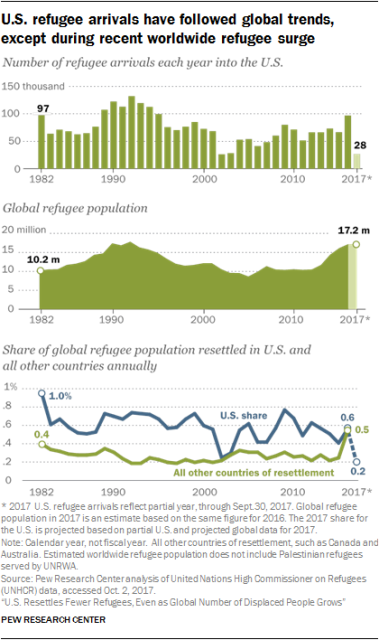For the first time in 35 years, the United States will not take in more refugees than the rest of the world combined.
Since 1980, more than 3 million of the world’s refugees have settled in America, according to a new study released today by the Pew Research Center. That’s more than any other country in the world, in terms of resettlement (which is different than hosting people escaping conflict areas, who typically flood neighboring countries but are not officially resettled there).
“In years when more people around the globe are displaced by conflict, violence, or persecution in their countries, the number of refugees resettled by the US has increased,” researchers wrote. “But in the last few years, the number of refugees annually resettled by the US has not consistently grown in step with a worldwide refugee population that has expanded nearly 50 percent since 2013.”
The numbers reflect only the percent of refugees that are resettled, which is only a tiny amount of those who are displaced. For example, while 17.2 million people fled their homes in 2016, only 1 million of them were deemed eligible for resettlement by the United Nations. And of those, just 189,000 were resettled worldwide—about half of them in the US (51%).
That’s how America, which resettled an average of just 0.6 percent of the world’s refugees every year between 1982 and 2016, is still technically a refugee’s best shot for a stable new life. The US took in a whopping 69 percent of the world’s resettled refugees during that period, far outpacing Canada (No. 2 at 14%) and Australia (No. 3 at 11%).

Overall, the US numbers have reflected the trends of international events. When the number of refugees rose to 17.8 million in 1992, the number of those finding a home in the US rose to 132,000. When it fell in the early part of the 21st century, those resettled in the US fell to about 50,000 a year.
But American resettlement trends also reflect the national mood. After 9-11, the number of resettled refugees dropped off sharply as vetting ramped up. In response to ISIS, President Barack Obama raised limits (but still not as generously as the US had been in the 1990s). And after running an anti-immigration campaign, President Donald Trump cut the 2017 intake from Obama’s planned 100,000 to 50,000.
Overall, half of refugees resettled in America over the past 15 years came from four countries: Burma (Myanmar), Iraq, Somalia, and Bhutan. The Democratic Republic of the Congo, Iran, Cuba, Ukraine, Sudan, and Russia round out the top 10.
Most refugees in the last few years have come from the Middle East and Africa (up from 17% in 2002 to 68% in 2017) and speak Arabic (up from 3% in 2002 to 23% in 2017). A larger share are also Muslim (up from 23% in 2002 to 39% in 2017).
But that increase hasn’t significantly cut into the number of Christians that are resettled. Their share dropped only slightly, from 52 percent in 2002 to 49 percent in 2017, according to the State Department’s Refugee Processing Center. From 2002 to 2017, Christian refugees were resettled more often than any other religion.

Increasingly, refugees are settling in America’s most religious areas. Over the past 15 years, the number of refugees that settle in the South more than doubled, from 7,000 to 16,000. The Midwest tripled its resettled refugees, from 5,000 to 15,000.
The West (10,000 to 15,000) and Northeast (5,000 to 8,000) also grew, but less dramatically.
However, two of the three most hospitable states are on the coasts. California took in the most refugees between 2002 and 2017 (105,000), followed by Texas (84,000) and New York (55,000). Together, they’ve taken in more than a quarter of all refugees (27%).
The Trump administration has capped refugees for fiscal year 2018 at 45,000—the lowest since presidents were given the power to set limits back in 1980.
World Relief president Scott Arbeiter called the number “very troubling, especially as the persecution of many religious minorities, including Christians, is on the rise globally.
“The refugee program has been a lifeline of protection for persecuted individuals, in particular, persecuted Christians, around the world,” he stated. “We should take every opportunity to protect them, including through the strategic use of resettlement.”











